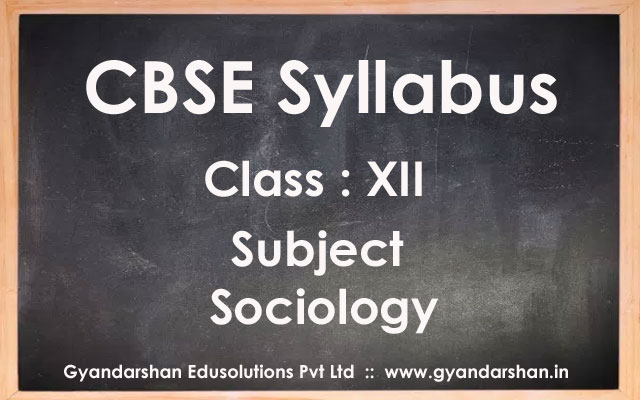
Sociology Class XII Syllabus
Exam Structure
| Unit | Topic | Marks |
| A. | Indian Society | 32 |
| 1 | Introducing Indian Society (Non-evaluative) | – |
| 2 | Demographic Structure & Indian Society | 6 |
| 3 | Social Institutions-Continuity and change | 6 |
| 4 | Market as a Social Institution | 6 |
| 5 | Pattern of Social Inequality and Exclusion | 6 |
| 6 | Challenges of Cultural Diversity | 8 |
| 7 | Suggestions for Project Work (Non-evaluative) | – |
| B. | Change and Development in Indian Society | 48 |
| 8 | Structural Change | 6 |
| 9 | Cultural Change | 6 |
| 10 | The Story of Democracy | 6 |
| 11 | Change and Development in Rural Society | 6 |
| 12 | Change and Development in Industrial Society | 6 |
| 13 | Globalization and Social Change | 6 |
| 14 | Mass Media and Communications | 6 |
| 15 | Social Movements | 6 |
| Total | 80 |
A. INDIAN SOCIETY
Unit 1: Introducing Indian Society
- Colonialism, Nationalism, Class and Community
Unit 2: Demographic Structure and Indian Society
- Theories and concepts in demography
- Rural-Urban Linkages and Divisions
Unit 3: Social Institutions: Continuity and Change
- Family and Kinship
- The Caste System
Unit 4: Market as a Social Institution
- Sociological perspectives on markets and the economy.
- Globalization – Interlinking of Local, Regional, National and International Markets.
Unit 5: Pattern of Social Inquality and Exclusion
- Caste Prejudice, Scheduled Castes and Other Backward Classes
- Marginalization of Tribal Communities
- The Struggle for Women’s Equality
- The struggles of the Differently Abled
Unit 6: The Challenges of Cultural Diversity
- Cultural communities and the nation state
- Problems of Communalism, Regionalism and Casteism
- The Nation state, religion related issues and identities
- Communalism, secularism and the nation state
- State and Civil Society
Unit 7: Suggestions for Project Work
B. CHANGE AND DEVELOPMENT IN INDIA
Unit 8: Structural Change
- Colonialism, Industrialization, Urbanization
Unit 9: Cultural Change
- Modernization, Westernization, Sanskritisation, Secularization
- Social Reform Movements and Laws
Unit 10: The Story of Democracy
- The Constitution as an instrument of Social Change
- Parties, Pressure Groups and Democratic Politics
- Panchayati Raj and the Challenges of Social Transformation
Unit 11: Change and Development in Rural Society
- Land Reforms, Green Revolution and Emerging Agrarian society
- Agrarian Structure : Caste & class in Rural India
- Land Reforms
- Green revolution and its social consequencess
- Transformation in Rural Society
- Globalization, Liberalization and Rural Society
Unit 12: Change and Development in Industrial Society
- From Planned Industrialization to Liberalization
- Getting a Job
- Work Processes
Unit 13: Globalisation and Social Change
- Dimensions of Globalization
Unit 14: Mass Media and Communication
- Types of Mass Media: Radio, Television and Print Media
- Changing Nature of Mass Media
Unit 15: Social Movements
- Theories and Classification of Social Movements
- Class-Based Movements: Workers, Peasants
- Caste-Based Movements: Dalit Movement, Backward Castes, Trends in Upper Caste Responses
- Women’s Movements in Independent India
- Tribal Movements
- Environmental Movements













